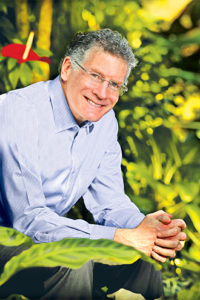
How predictable is evolution? The answer long has been debated by biologists grappling with the extent to which history affects the repeatability of evolution.

A review published in the Nov. 9 issue of Science explores the complexity of evolution’s predictability in extraordinary detail. In it, researchers from Kenyon College, Michigan State University and Washington University in St. Louis closely examine evidence from a number of empirical studies of evolutionary repeatability and contingency in an effort to fully interrogate ideas about contingency’s role in evolution.
The question of evolution’s predictability was notably raised by the late paleontologist Stephen Jay Gould, who advocated the view that evolution is contingent and unrepeatable in his 1989 book “Wonderful Life”. “Replay the tape a million times … and I doubt that anything like Homo sapiens would ever evolve again,” Gould mused, noting that being able to “replay the tape” and give history a do-over would be impossible.
Yet since the publication of “Wonderful Life”, many evolutionary biologists have taken up this challenge and conducted their own versions of Gould’s experiment, albeit on smaller scales. In doing so, they have reached different conclusions about the interplay between randomness of mutations, chance historical events, and directionality imparted by natural selection.
“How history plays out isn’t really predictable. Historical outcomes are contingent on long chains of events loaded with tiny little details,” said Zachary Blount, senior research associate at Michigan State and a visiting assistant professor of biology at Kenyon, and lead author of the review. “Unlike history, though, evolution has the deterministic force of natural selection, but that determinism is always in tension with the chanciness. How does that tension affect what evolves? Which is more important: contingency on details of history, or determinism?”
Assisting Blount in the research was Richard Lenski of Michigan State and Jonathan Losos, the William H. Danforth Distinguished University Professor at Washington University and professor of biology in Arts & Sciences.
The researchers focused primarily on three types of “replay studies”: laboratory evolution experiments with fast-evolving organisms — notably, the long-term evolution experiment with E. coli, started by Lenski in 1988; experiments that attempt to replicate evolution in natural settings; and experiments that compare lineages that evolved under similar conditions.
As an example of the third kind of replay, Losos has worked extensively with the anole lizards of the Caribbean, which separately evolved traits such as the length of their legs and tails to ease life in specific habitats.
What emerges in the review in Science is a complex picture of evolutionary change in which both contingency and determinism are evident.
“What we clearly see is that both convergence and lack of convergence occur a lot in the natural world,” said Losos, who also serves as director of the Living Earth Collaborative. “It’s not useful just to keep adding to the two lists. The real question that people are now turning to is: Why does convergence occur sometimes and not others? That is where research is now headed. That’s the question we need to focus on.”
Read the full story at Kenyon College: Replaying the tape of life: Is it possible? Evolutionary biologists explore the role of history in evolution
Read the review: Contingency and determinism in evolution: Replaying life’s tape

Comments and respectful dialogue are encouraged, but content will be moderated. Please, no personal attacks, obscenity or profanity, selling of commercial products, or endorsements of political candidates or positions. We reserve the right to remove any inappropriate comments. We also cannot address individual medical concerns or provide medical advice in this forum.